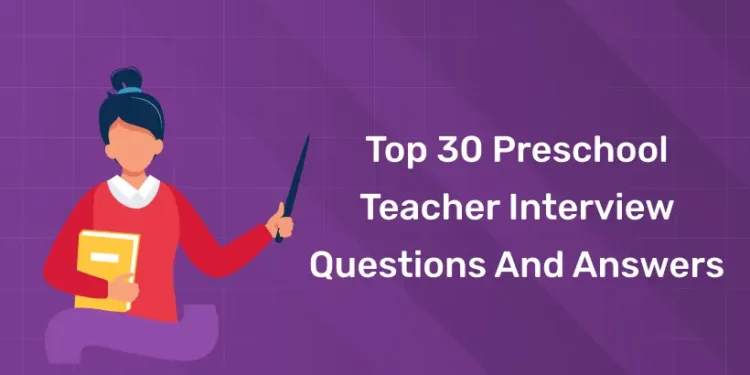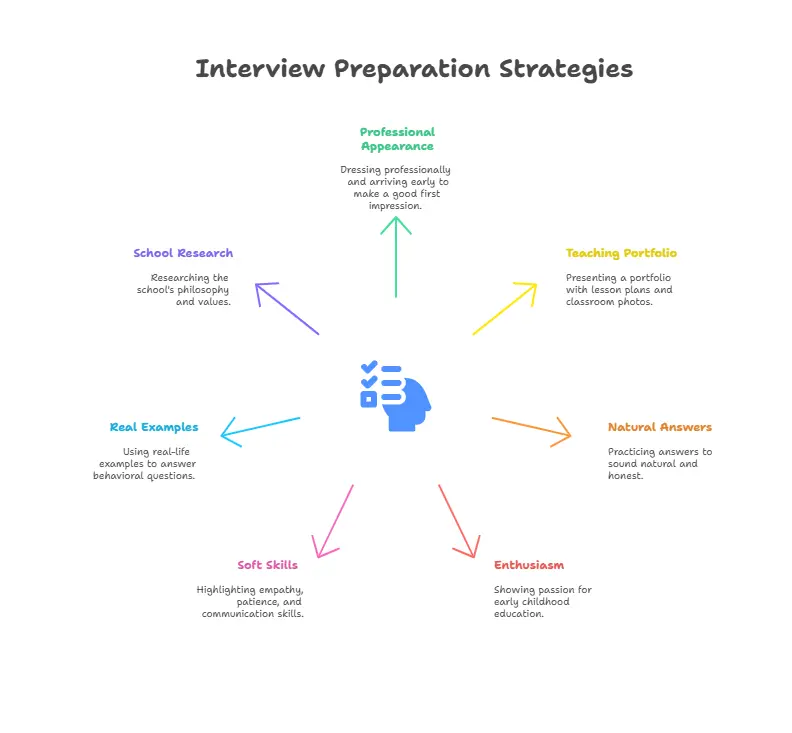Table of Contents
The possibility of becoming a preschool teacher is a thrilling and frightening thought. Becoming a potential candidate for employment as an early childhood educator is more than it seems to be. You are venturing into the holy ground, where you hold the authority to touch the lives of young children. Preschool teacher interviews are not meant to examine more than your credentials; they evaluate your personality, patience, teaching style, and interest in working with young children. In this blog, we will give you the whole list of most used preschool teacher interview questions and answers and some tips on how to pass the interview and make a good impression on possible employers.
Unlock your passion for education and shape young minds as a Montessori teacher!
Common Preschool Teacher Interview Questions
Here are some of the most common questions to learn more about you, your personality, and your teaching philosophy.
1. Tell me about yourself.
Answer:
“I have an early childhood education degree and am a certified preschool teacher. I love working with children and have been interning for the past year at a Montessori school, where I learned the skill of designing engaging and child-focused activities. And I am creative, patient, and passionate about making learning come alive for young children.”
2. Why do you want to work with preschoolers?
Answer:
“They’re so inquisitive and creative at this age. To be able to assist them socially, emotionally, and intellectually when it is so paramount in their life is rewarding.
3. What is your philosophy of teaching?
Answer:
“I am very interested in acquisition through play. The children will learn most effectively when they’re happy and engaged, and I use interactive approaches, reading, and hands-on inquiry to help them find out and construct.”
4. What are the qualities must a preschool teacher possess?
Answer:
“Patience, imagination, empathy, and effective communication skills are needed. The good preschool teacher must also be flexible and perceptive enough to adjust to all the children’s needs.”
5. What would you do with a mischievous child in the class?
Answer:
“I practice positive reinforcement and redirection. I firmly correct the behavior, tell the child why what they are doing is not good, and redirect them to a better option.”
Behavioral Interview Questions and Answers
Your current working knowledge as well as your ability to think under pressure are tested in these questions.
6. Give an example of a time when you had to deal with a difficult parent.
Answer: My mom was concerned for the growth of the child, so I expressed my perspective. I listened to them, presented the portfolio of the child before them, and explained to them how we learn. Open communication helped us agree on a plan.
7. What do you do in your classroom to teach students at varying levels of ability?
Answer: “Yes.” I ensure a range of learning styles and abilities are covered in my work planning. Making all feel included is achievable through group work, PlayStation activities, and individual support.
8. Explain a good lesson that you have taught.
Answer: Yes, I have done a ‘Colors Around Us’ unit before where children identified colors with things at home. We had games, painted, and went on a color scavenger hunt. Young minds were amazed, and the concept was ingrained.
9. What do you do when the work environment is chaotic and turns stressful?
Answer: No, I remain calm, compile a list of all that needs to be done, and ensure that the needs of the children are addressed. I also ensure that I take deep breaths and that flexibility is the key when it comes to early learning.
10. If a child flatly refuses to participate in group work, what would you do?
Answer: I would comfort the child gently and not insist on my will. They might feel more comfortable if you offer them a low-level task or take them out one by one.
11. How do you make your classroom a secure place for students?
Answer: consistent monitoring, age-appropriate resources, and the teaching of rules through narratives and rituals.”
12. What are some ways to get parents involved in their child’s education?
Answer: Through activity updates, frequent parent-teacher meetings, and newsletters.”
13. Have you ever planned lessons before?
Answer: I make sure that each week’s schedule is filled with learning-focused activities that incorporate sensory play, play-based learning, and other forms of play.
14. What are the best ways to evaluate a kid’s progress in milestones?
Answer: By means of informal evaluations, checklists, portfolios, and direct observation.
15. What methods do you use to ensure order in the classroom?
Answer: Calm transitions, clear rules, visual schedules, and praise for good behavior.
16. How can toddlers learn to interact with others?
Answer: Exercising appropriate communication skills through role-playing, storytelling, and modeling.
17. What is your preferred method of classroom instruction?
Answer: Storytime with puppets is a wonderful way to engage kids and encourage their creativity, as the answer suggests.
18. As a teacher, what do you believe to be your greatest strength?
Answer: My capacity to form secure attachments with kids is the answer.
19. In your position, how would you respond in the event that a kid falls and hurts themselves?
Answer: Remain composed, administer first aid, notify the parents, and record the occurrence.
20. Explain your strategy for dealing with students’ diverse cultural backgrounds.
Answer: Include diverse activities, songs, and books in your celebration of diversity.
Tips for Acing Your Preschool Teacher Interview
1: What is the primary focus of the first plane of development in the Montessori method?
Here are a few expert tips to make your interview smooth and confident:
- Get familiar with the school in advance
Learn about pedagogy, class size, values, and type of curriculum (e.g., Montessori, play-based, etc.).
- Dress informally yet professionally.
Dress modestly and neatly to portray yourself as a responsible and caring teacher.
- Bring a portfolio of your teaching materials.
Document all you’ve got: diplomas, images of past classes, student ratings, and proof of Montessori training (from sources like Entri, for example).
- Rehearse on some example interview questions
Be yourself, but be ready when you talk. Where feasible, draw on personal experience.
- Demonstrate passion for teaching young children
Tell me about your style of interacting with children and how you facilitate learning and development through play and learning. Soft skills such as classroom management, imagination, patience, and empathy are some illustrations of critical skills.
- Prepare to talk about challenges
Give an illustration of a professional experience where you managed difficult students, parent-teacher conferences, or class disruptions.
- Ask probing questions
Inquire about opportunities for professional growth, networks of teachers, and expectations from schools.
- Act with integrity and sincerity.
Show your passion for teaching. Humble, confident, and ambitious to advance their professions, teachers are well respected.
Unlock your passion for education and shape young minds as a Montessori teacher!
Get Certified & Start Your Montessori Career
Montessori Teacher Training Course by Entri App: Gain expert skills, earn certification, and kickstart your teaching career.
Join Now!Wrapping Up
Showing passion for teaching and mentoring young minds is as valuable as having the right answers when conducting interviews to work as a preschool teacher. You can leave long-lasting impressions on interviewers as an embodiment of a combination of knowledge, confidence, and integrity to help children. Use the sample questions and tips provided in this book to stand out. Remember, each school is looking for a teacher who is able to make their students think and feel with something greater than facts. If you have faith in yourself and what you are able to accomplish, it will be that much easier to land a job teaching young children.
Get Certified & Start Your Montessori Career
Montessori Teacher Training Course by Entri App: Gain expert skills, earn certification, and kickstart your teaching career.
Join Now!Frequently Asked Questions
What is a teaching portfolio, and should I bring one?
Yes, a portfolio showcases your certificates, lesson plans, and classroom work. It helps highlight your skills during the interview.
How long do preschool teacher interviews typically last?
Interviews generally last between 30 to 45 minutes, sometimes including a demo lesson or child interaction.
Will I need to conduct demo classes during the interview process?
Some schools may ask for a short demo lesson to observe your teaching style and interaction with children.
How do I demonstrate my classroom management skills during the interview?
Share specific examples of how you’ve handled challenging behaviors, transitions, or kept children engaged and safe.
Should I bring physical materials to the interview?
Yes. A folder with your resume, certificates, photos of activities, and lesson samples can leave a strong impression.
What are some red flags that could cost me the job?
Lack of preparation, disinterest in children, poor communication, or not being familiar with basic teaching strategies.
What are interviewers looking for in a preschool teacher?
They look for passion, patience, communication skills, creativity, classroom experience, and a genuine love for working with children.












